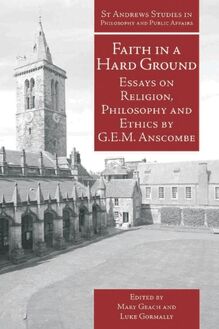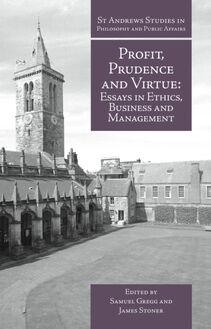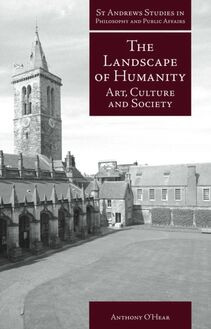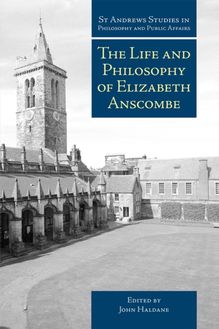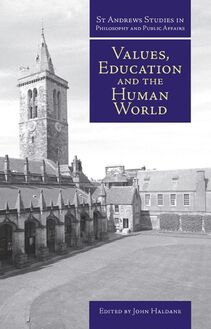Profit, Prudence and Virtue , livre ebook
173
pages
English
Ebooks
2011
Vous pourrez modifier la taille du texte de cet ouvrage
Obtenez un accès à la bibliothèque pour le consulter en ligne En savoir plus
Découvre YouScribe en t'inscrivant gratuitement
Découvre YouScribe en t'inscrivant gratuitement
173
pages
English
Ebooks
2011
Vous pourrez modifier la taille du texte de cet ouvrage
Obtenez un accès à la bibliothèque pour le consulter en ligne En savoir plus
Publié par
Date de parution
30 novembre 2011
Nombre de lectures
2
EAN13
9781845402891
Langue
English
Poids de l'ouvrage
1 Mo
Publié par
Date de parution
30 novembre 2011
Nombre de lectures
2
EAN13
9781845402891
Langue
English
Poids de l'ouvrage
1 Mo
Title Page
PROFIT, PRUDENCE AND VIRTUE
Essays in Ethics, Business and Management
Edited by Samuel Gregg and James Stoner
Title Page Verso
Copyright © This collection Imprint Academic, 2009
The moral rights of the authors have been asserted.
No part of this publication may be reproduced in any form without permission, except for the quotation of brief passages in criticism and discussion.
Originally published in the UK by Imprint Academic
PO Box 200, Exeter EX5 5YX, UK
Originally published in the USA by Imprint Academic
Philosophy Documentation Center
PO Box 7147, Charlottesville, VA 22906-7147, USA
Cover Photograph:
St Salvator’s Quadrangle, St Andrews by Peter Adamson from the University of St Andrews collection
Contributors
Philip Booth is Editorial and Programme Director at the Institute of Economic Affairs and Professor of Insurance and Risk Management at Cass Business School, City University. He was formerly Associate Dean of Cass Business School and Programme Director of the Specialist Masters Programme. He has published widely in the fields of actuarial science, social insurance, pensions and regulation.
Anthony (A.M.) Daniels is an English writer and retired physician, who frequently uses the pen name ‘Theodore Dalrymple.’ He has written extensively on culture, art, politics, education, and medicine, both in Britain and overseas. Before retiring from medicine, Dr. Daniels worked as a physician and psychiatrist in Zimbabwe, South Africa, Tanzania, and more recently at a prison and a public hospital in Birmingham, in central England. He has written columns appearing in The New Criterion , The Spectator , and in City Journal , a magazine of the Manhattan Institute. He is the author of such books as Coups and Cocaine (John Murray, 1986), Zanzibar to Timbuktu (John Murray, 1988), and most recently, In Praise of Prejudice: The Necessity of Preconceived Ideas (Encounter Books, 2007). He is the Dietrich Weismann fellow at the Manhattan Institute.
R. Edward Freeman is a philosopher and Professor of Business Administration at the Darden School of Business at the University of Virginia. He also has taught at the University of Minnesota and the Wharton School. Professor Freeman is particularly known for his work on stakeholder theory and business ethics. His latest book is Managing for Stakeholders (Yale University Press, 2007, with Jeffrey Harrison and Andrew Wicks). He is currently working on a book called Stakeholder Theory: The State of the Art . Professor Freeman received a BA from Duke University in 1973 and a PhD from Washington University in 1978.
Robert P. George is McCormick Professor of Jurisprudence, founding director of the James Madison Program in American Ideals and Institutions at Princeton University, and the Herbert W. Vaughan Senior Fellow of the Witherspoon Institute. He is a member of the President’s Council on Bioethics and formerly served as a presidential appointee to the United States Commission on Civil Rights and was a Judicial Fellow at the Supreme Court of the United States. His books include Making Men Moral: Civil Liberties and Public Morality (Oxford University Press, 1993), The Clash of Orthodoxies: Law, Religion and Morality in Crisis (ISI Books, 2001), In Defense of Natural Law (Oxford University Press, 1999), and Embryo: A Defense of Human Life (Doubleday, 2008, with Christopher Tollefsen). Professor George has won numerous Prizes and Awards. A graduate of Swarthmore College and Harvard Law School, he holds a doctorate in legal philosophy from Oxford University.
Samuel Gregg writes and speaks on questions of political economy, ethics in finance, and economic history. He is Director of Research at the Acton Institute and a consultant for Oxford Analytica Ltd. He holds an MA in political philosophy from the University of Melbourne, and a DPhil in moral philosophy and political economy from the University of Oxford. Dr. Gregg is the author of several books, including Morality, Law, and Public Policy (St. Thomas More Society, 2000), Economic Thinking for the Theologically Minded (University Press of America, 2001), On Ordered Libert y (Lexington Books, 2003), and The Commercial Society (Lexington Books, 2007). The latter was awarded a 2007 Templeton Enterprise Award for being one of the best books published on the culture of enterprise. His forthcoming book, Wilhelm Röpke’s Political Economy , will be published in 2010.
Edwin Hartman is Visiting Professor of Business Ethics and the Peter and Charlotte Schoenfeld Visiting Faculty Fellow at the Stern School of Business at New York University. He was previously director of the Prudential Business Ethics Center at Rutgers Business School. Professor Hartman is the author of Substance, Body, and Soul: Aristotelian Investigations (Princeton University Press, 1977), Conceptual Foundations of Organization Theory (Ballinger Publishing, 1988), and Organizational Ethics and the Good Life (Oxford University Press, 1996), along with many articles.
Kevin T. Jackson is Professor of Legal and Ethical Studies at Fordham University in New York City and Visiting Professor of Politics at Princeton University. Formerly on the faculty of Georgetown University and Peking University, he has published numerous journal articles as well as books, such as Building Reputational Capital (Oxford University Press, 2004) and Charting Global Responsibilities: Legal Philosophy and Human Rights (East-West Press, 1997). Professor Jackson frequently gives analysis of legal and moral issues for the media and has presented seminars on business integrity and leadership. His advice on mutual-fund industry-regulation reform has been published in The New York Law Journal .
Harold James , who holds a joint appointment as Professor of International Affairs in the Woodrow Wilson School of Princeton University, and as Marie Curie Professor at the European University Institute in Florence, studies economic and financial history and modern German history. He was educated at Cambridge University (PhD, 1982) and was a Fellow of Peterhouse for eight years before coming to Princeton University in 1986. Professor James’s books include a study of the interwar depression in Germany, The German Slump (OUP, 1986); an analysis of the changing character of national identity in Germany, A German Identity 1770-1990 (Routledge, 1989); and International Monetary Cooperation Since Bretton Woods (OUP, 1996). He was coauthor of a history of Deutsche Bank (Weidenfeld and Nicholson, 1995), which won the Financial Times Global Business Book Award in 1996, and he also wrote The Deutsche Bank and the Nazi Economic War Against the Jews (CUP, 2001). Professor James’s most recent works are The End of Globalization: Lessons from the Great Depression (Harvard, 2001); Europe Reborn: A History 1914-2000 (Pearson Longman, 2003); The Roman Predicament: How the Rules of International Order Create the Politics of Empire (Princeton, 2006); and F amily Capitalism: Wendels, Haniels, Falcks, and the Continental European Model (Harvard, 2006). In 2004 he was awarded the Helmut Schmidt Prize for Economic History, and in 2005 the Ludwig Erhard Prize for writing about economics.
Sean Kelsey has been Associate Professor of Philosophy at the University of California, Los Angeles since 1998. He received his BA from Thomas Aquinas College (1992) and his PhD in philosophy from Princeton (1997) within the Program in Classical Philosophy. Professor Kelsey specializes in ancient Greek philosophy, especially Plato and Aristotle.
Thomas Krause is Chairman of the Board for BST, a consulting firm specializing in comprehensive safety solutions. Since he founded BST in 1979, he has helped thousands of companies worldwide to prepare and implement successful change systems. Dr. Krause is actively involved in leadership coaching. He has spoken widely on a multitude of topics at national and international conferences and is regularly quoted by the media. Dr. Krause has authored several books and articles on safety and leadership, including Leading With Safety (Wiley, 2005). His latest book, Taking the Lead in Patient Safety: How Leaders Influence Behavior and Create Culture , was published in 2008. Dr. Krause received his MA in liberal arts from St. John’s College in Santa Fe, New Mexico, and his PhD from the University of California, Irvine. Dr. Krause is a licensed psychologist.
Wilfred M. McClay has been the SunTrust Bank Chair of Excellence in Humanities at the University of Tennessee, Chattanooga, where he has also been a professor of history since 1999. Professor McClay also has taught at Georgetown University, Tulane University, Johns Hopkins University, and the University of Dallas, is senior scholar at the Woodrow Wilson International Center for Scholars in Washington, D.C., and is senior fellow at the Ethics and Public Policy Center in Washington, D.C. He is author of The Masterless: Self and Society in Modern America (University of North Carolina Press, 1994) and Figures in the Carpet: Finding the Human Person in the American Past (William B. Eerdmans Publishing, 2007). Professor McClay was educated at St. John’s College (Annapolis) and the Johns Hopkins University, where he received a PhD in history (1987).
Chris Megone is Professor of Applied Inter-Disciplinary Ethics at the University of Leeds where he is Director of Inter-Disciplinary Ethics Applied (IDEA CETL). He teaches on subjects ranging from Medical Ethics and Business Ethics to Ethics in Engineering, Dentistry, and Media. He also teaches Ancient Philosophy at Leeds and has research interests in moral psychology as well as ethics, applied ethics, and political philosophy.
David L. Newkirk is CEO of Executive Education at the University of Virginia’s Darden School of Business. He is resp





